#let’s go queers let’s go
Explore tagged Tumblr posts
Text
So I started reading he is brutal the snipersscout speedingbullet fanfic because I finished Running blind and taking shots. (Waiting for the next chapter)
And like I’m not even at the first chapter proper I’m at the prologue and I’m kicking my feet giggling. The descriptions of thrones and setting is so well done guys go read it
edit; OH BTW GO FOLLOW @sweetcookie500 THEY WROTE THE FIC
#he is brutal#tf2#team fortress 2#speedingbullet#sniperscout#He is brutal: Beau is he#i’m just a girl#who needs her gay men#let’s go queers let’s go#YEAAAAAAAH#running blind#taking shots#the triggered happy#thetriggeredhappy
26 notes
·
View notes
Text
good thing from jp twitter this week is queen of old man yaoi michiru sonoo discovering the term old man yaoi
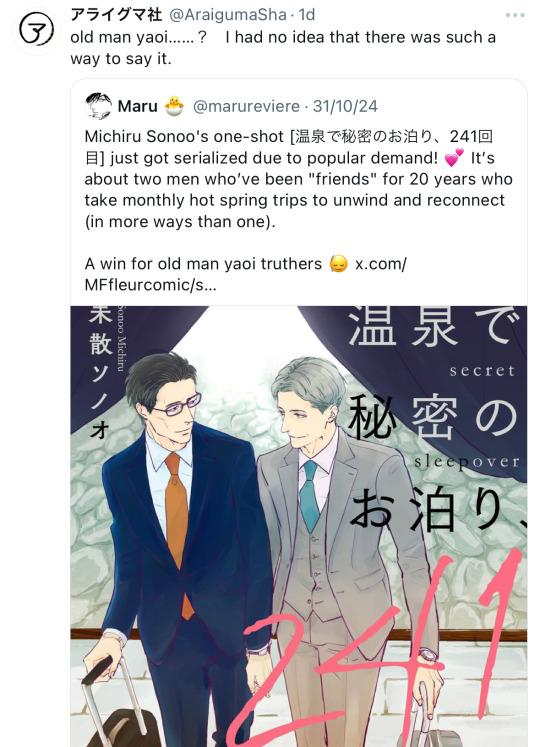
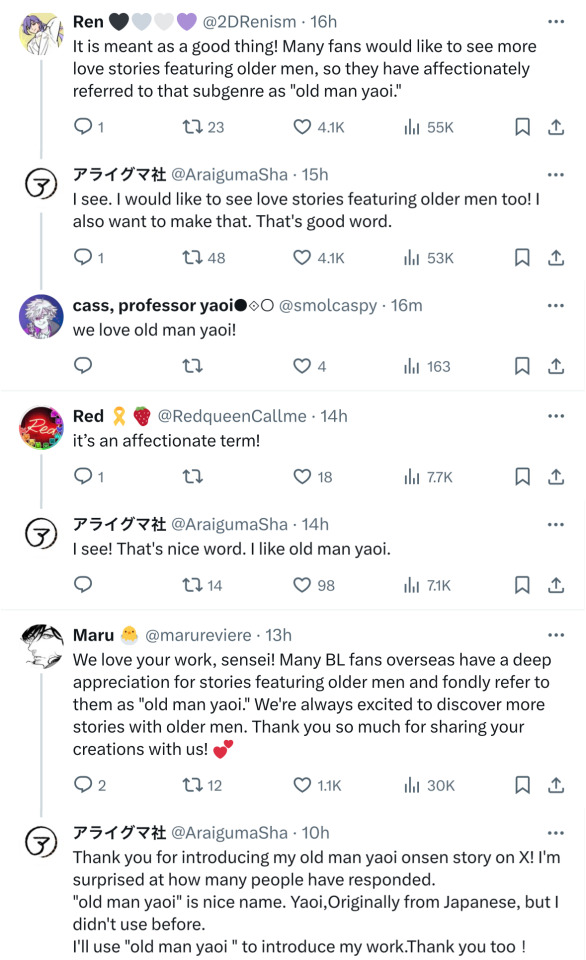
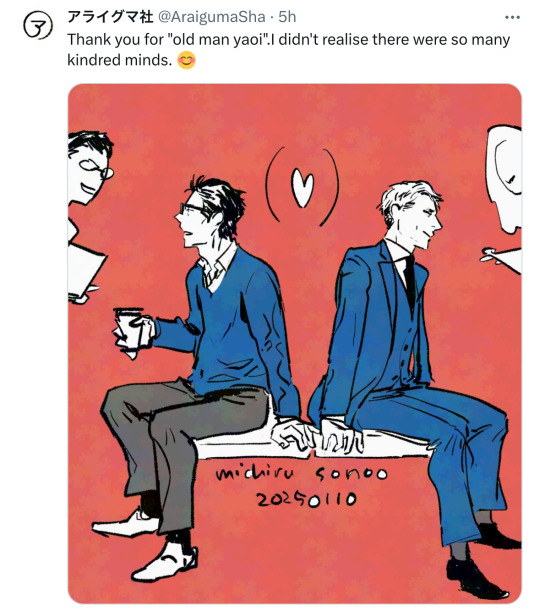


update: somehow it got impossibly more wholesome
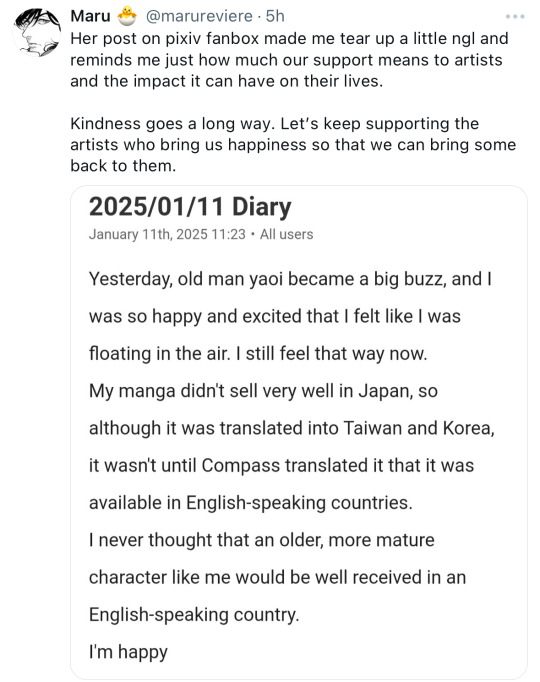
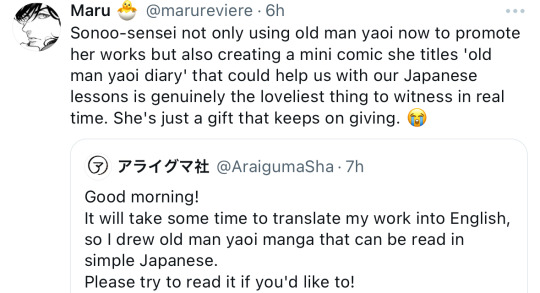
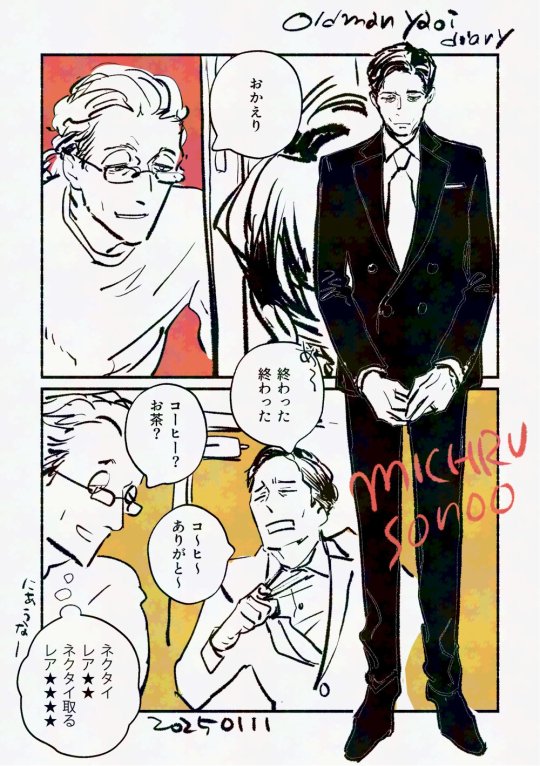
quick translation: おかえり: welcome home あ 終わった 終わった: ahhh, it's over! it's done! コーヒー? お茶?: coffee? tea? コ~ヒ~ ありがと: coffee, thank you~ ネクタイレア★★ ネクタイ取るレア★★★★: seeing him with a tie on, rarity level ★★, seeing him take a tie off, rarity level ★★★★ にあうな~: it suits him~
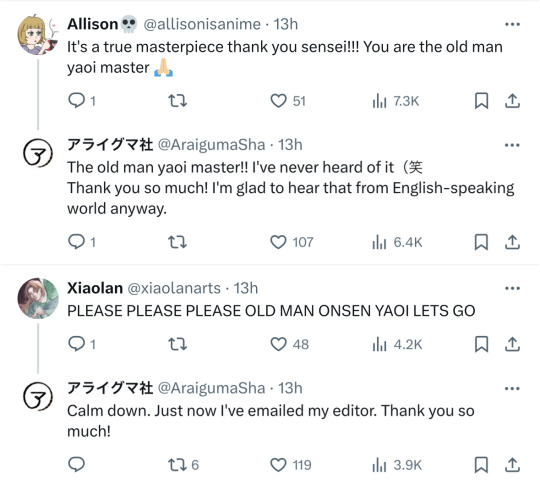

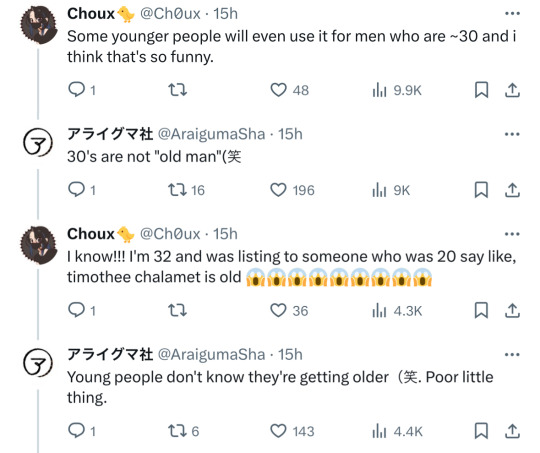


also please do follow: AraigumaSha: sensei's twitter account marureviere: maru, who does such valuable work highlighting bl manga for an international audience
#'this is my old man yaoi masterpiece' <3333#soooooo cute she is SO excited and pleased about it and so giddily interacting with international fans about it#and marvelling to japanese fans like: did you guys know about this??? old man yaoi \o\ \o/#psttt michiru-sensei you want to do a severance doujinshi soooo bad. please.#meanwhile foul thing from jp twitter this week is the man boasting about how he made deepfake p*rn of his girlfriend's best friend#because he couldn't stop thinking about her#and also he thought he was being such a Good Boyfriend he actually told his girlfriend about it#and he was furious she was furious#he was like women........ i'm doing this for the good of our relationship but women never understand our (men's) sacrifices#you know all those doombait articles about how japan is going to go extinct#maybe that should happen.#anyway. let old man yaoi heal you until then.#michiru sonoo#manga#yaoi#twitter#old man yaoi#queer#gay#long post#lgbt#japan#japanese
37K notes
·
View notes
Text
can't believe we're all adults being forced into the club penguin level of censorship in 2024
#ramble#if you say unalive in front of me i will personally kill you with my hands#you just can't muffle and censor and hold someone's hand through some things#some things are horrible. and they should be spoken aloud and they should upset you. because they are horrible#the second we started kidzbopifying the world was the end of taking anything seriously i think#i'm not even joking i've spoken to people older than me who won't even say the world sex#this isn't the playground you're not going to get in trouble just let us say the word!!!!!!#how am i supposed to listen to you when you won't even say the thing you're supposed to be talking about#yes this is the fault of the platforms with their censorship rules but the fact that we all just go along with it like it's not dystopian#you do know it doesn't stop with cursing right. people are already having to censor queer terms because they get flagged as inappropriate
52K notes
·
View notes
Text
Perv dad telling his boy that he's got a new game for them, a new skill to teach him as a growing young man. Stupid loving son who follows him like a puppy, thinking they're just play fighting. Taking it so bravely until his daddy's cock is pulsing and throbbing as it stretches out his tight hole. Squirming and kicking at the sting of being stretched too far
"Shh shhh it'll feel better soon kiddo, big stretch for me— stop fighting... just hold onto your old man, come on and biggggg stretch~ Awwwww that's it baby, such a good kiddo. Now doesn't that feel better?... kiddo?"
Pretty son now limp as his daddy's heavy balls rest against his ass, cock fully sheathed in his fuckhole. Tight hole squeezing his dad's cock, practically teasing him for more
"Ohhh, does it feel so good you can't even talk sweetie? That's my boy, my champ, I told you it'd feel so much better once you stopped fucking squirming <3 Just like your mom, always stupider all filled up~"
#xochimilli writes#im dad <3 ANYWAYS WOAHS I AM BLUSHING OVER THIS LMAO who lets me go all the way in them pleaseeeee pleaseee#fauxc3st#fauxcest#dad x son#dadcon#dad/son#ftm top#ftm dom#queer nsft#ftm nsft#t4t nsft#dad bf#1cky puppy#puppy sub#bd/sm puppy#dumb puppy#trans nsft#daddy k!nk#daddy's pet#mlm nsft#mlm ns/fw#mlnb ns/fw#mlnb nsft#t4t ns/fw#t4t puppy#t4t mlm#ftm t4t#gay nsft#bd/sm pet
2K notes
·
View notes
Text


Not At Odds
Ceasefire Now + Bring Them Home Now
Jewish & Palestinian safety & freedom are not at odds with each other; they are interconnected. These things can must coexist.
#feel free to use#I know it’s not simple let alone easy#but safety & freedom for the Palestinian & Israeli people are not at odds. they are interconnected.#ceasefire now#bring them home now#let my people go#peace#pro-peace#coexistence#coexist#i/p#standing together#free palestine from hamas#queer pride#pride#return the hostages#jumblr#fuck bibi#fuck likud#fuck netanyahu#none of us are free until all of us are free#israeli palestinian solidarity#solidarity#bring the hostages home#bring them back#bring them all home
4K notes
·
View notes
Text
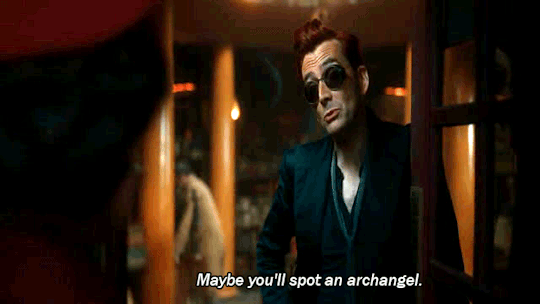
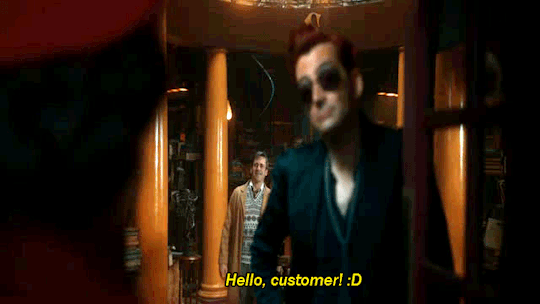

#Retail Mood
#Good Omens#goodomensedit#goedit#I know where I'm going#Crowley#Gabriel#Jim#Shax#My Gif#David Tennant#Jon Hamm#Miranda Richardson#AZ Fell and Co#Bookshop#LGBT#lgbtedit#Gay#Queer#Nonbinary#tvandfilm#Retail#Mood#dailytvfilmgifs#I love them a normal amount#They're all such moods#A+ acting#also feeling the whole vampire has to be invited in vibes#lmao Shax not being let in as it should but yeah#Gabejim you deserve hugs#and Crowley is good as always
1K notes
·
View notes
Text
can we talk about how much queer and trans joy was this season? maggie and nina. they/them muriel, saraquel, beelzebub, even GOD. "you're a good lad" "im not actually, either". that one shopkeeper and his non binary spouse, played by a non binary actor. beelzebub and gabriel. shax, nina and maggie all thinking azi and crowley were together. also yes i'm gonna mention: crowley and aziraphale's kiss. it's just, i get that everyone's hurt and so am i but can we please focus on how beautiful this season was to us? we got so much and i'm so happy, despite the ending.
#i love queer people i love queer joy i love this show i love us sm#also crowley deliberately avoiding using 'mr' in the 1827 flashback cause she was SO CLEARLY presenting fem#this season was literally just queer people doing crazy shit for each other and im actually emotional over how accepted everyone was#in the show and how fucking easy it is to have queer and trans characters on screen and just let them be. im gonna ugly sob#good omens#good omens s2#azicrow#good omens season 2#good omens s2 spoilers#go s2 spoilers#go spoilers#go s2#ineffable bureaucracy#ineffable spouses#i just realized god is actually they/she but that's cool af too#AND ELSBETH AND WEE MORAG TOO WOOOHOO GO SAPPHICS
8K notes
·
View notes
Text









I like you, Q. I like you too.
#kidnap the series#kidnapedit#minq#min x q#ohmleng#ohm pawat#leng thanaphon#bl drama#bl series#thai bl#thai drama#thdrama#queer drama#dailylgbtq#boyslovesource#mlmsource#asianlgbtqdramas#asiandramasource#asiandramaedit#asiandramanet#ok boys!! lets go!!#they gave me more than i expected#my gifs
603 notes
·
View notes
Text


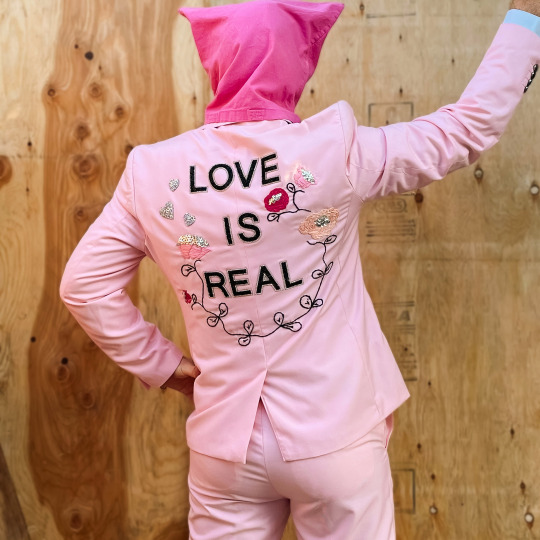
first traditionally published novel CAMP DAMASCUS out today with @torbooks. thanks to all you buckaroos for proving that sometimes if you stand proud of your unique way you wont bend to the timeline, the timeline bends to you. we did this. LOVE IS REAL. out now buds bit.ly/CampDamascus
#camp damascus#queer#horror#buckaroo lifestyle#tingleverse#chuck tingle#love is real#actually autistic#lets trot#lgbtqia#here we dang go
4K notes
·
View notes
Text










Happiness in their home
#let free the curse of taekwondo#let free the curse of taekwondo ep 8#bl drama#bl series#myedit#korean bl#korean series#korean drama#kdrama#kbl#queer drama#queer series#lgbtqia+#the matching pyjamas!#I love them#and I am going to miss them
476 notes
·
View notes
Text
LETS GO LESBIANS WE JUST WON SO HARD

#i apologise for the person i will become when this drops.#jodie whittaker#doctor who#suranne jones#gentleman jack#lets go lesbians#queer#wlw#lesbians#sapphic#lesbian
323 notes
·
View notes
Text
Remember when the dragon prince gave us canonically gay married elves, an interspecies interrracial lesbian couple involving a disabled character, non-binary characters of colour, martyred lesbain queens and mothers, a transmasc elf in a happy relationship whose transness isn't at the center of his relationship, and a trans woman who literally saves the world; all while never depicting queerness as something other than completely normal and accepted within that universe and still constructing relevant and important arcs for each of these queer characters that are essential in furthering the story. Because I do.
#the dragon prince#tdp#me talking#just finished season 7 after honestly kind of forgetting about this show for a few years#like who was going to remind me that this is a good queer show#was very tempted to put soren and corvus in here too but didn't want to detract from the actual canon storylines#but let it be known that I absolutely adore them too
251 notes
·
View notes
Text


YALL CRACKING ME UP SO HERE!!! WE RALLY, WE GATHER, WE ARE UNITED!! WELCOME TO "FUCK IS GENDER" SYNDICATE, AKA "FIG" YALL ARE ALREADY MAX RANK CONGRATULATIONS
#warframe#warframe art#meme warframe#fig syndicate#fuck is gender#we are queer we are free let's go#UNITED AS ONE BUT NOT LIKE NARMER
212 notes
·
View notes
Text

Found a photo of the lesbian bus!
#lgbtq positivity#lgbt memes#lgbtlove#lgbtq#lgbtqia#lgbtqiia+#queer love#queer representation#let's go lesbians#butch lesbian#sapphic#wlw#lesbian pride#gay girls#wlw pride
6K notes
·
View notes
Text
Teenage queers will discover Tragedy and make it their whole personality forever
#it’s me#im teenage queers#the magicians#les mis#hadestown#ride the cyclone#fixated-on-magicians#quentin coldwater#eliot waugh#queliot#orpheus and eurydice#orpheus#eurydice#les miserables#fixated-on-rtc#fixated-on-hadestown#Éponine thenardier#eponine#I love you Éponine I love you Quentin I love you Orpheus I love you characters who fall in love hard and fast and don’t let go#musical theatre#tragedy#btw I mean tragedy the genre#not the concept#but I mean that too#fixated-on-lesmis
376 notes
·
View notes
Text
“Fear is a strange soil. It grows obedience like corn, which grow in straight lines to make weeding easier. But sometimes it grows the potatoes of defiance, which flourish underground.”
— Terry Pratchett, Small Gods
For everyone who is afraid right now, it is absolutely justifiable. Shit's gonna get scary. But remember:
“Susan says, don't get afraid, get angry.”
― Terry Pratchett, Hogfather
#gnu terry pratchett#terry pratchett#election 2024#us elections#us politics#trump#fuck trump#lgbtq+#queer#trans#They tried to bury me but they didn't know I am a potato#Let's go Girls Gays & Theys
351 notes
·
View notes